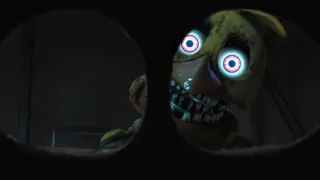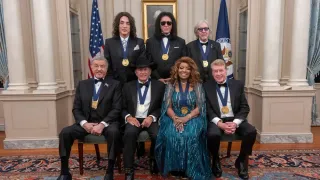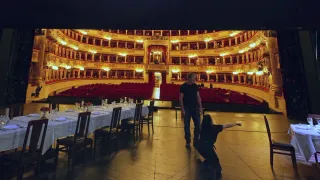January 30, 2019
Gay Culture's Latest Fashion Gift to Str8s: The Harness?
Kilian Melloy READ TIME: 2 MIN.
When "Black Panther" and "Creed II" star Michael B. Jordan recently wore a harness to the Screen Actors Guild Awards - a colorful Louis Vuitton harness, no less, which he wore over the top of his suit jacket - it was but the latest example of how one of gay culture's iconic fashions has entered the mainstream, notes UK newspaper The Guardian.
But the paper wasn't totally celebrating the crossover appeal of an accessory that, as the paper wrote, "is the uniform of the once underground gay leather bondage scene, a richly coded symbol of male sexual submission and control." Indeed, the Guardian fretted that straight celebs sporting the traditionally gay leather gear "erase[s] its roots in queer culture."
Vogue also took note of how celebs have taken to wearing harnesses to high-profile events where fashion is a key component and news of who wore what sometimes seems ready to overwhelm which awards went to which contenders. Vogue sidestepped any direct mention of gay fashion, characterizing the harness instead as having a "kinky connotation with S&M," but it wasn't hard to read between the lines. And the fact that it was "Call Me By Your Name" star Timoth�e Chalamet who wore a harness to the Golden Globes didn't feel entirely coincidental, either (despite his subsequent denial that he understood what it was he was wearing).
But, as the Guardian pointed out, this new trend began nearly a year ago, with gay Olympian athlete Adam Rippon sporting a harness to the Oscars - not wearing the accessory outside his tuxedo, but rather showing it off in partial view, with much of the harness concealed by the jacket (although the jacket's shoulders were cut away so as to give that much more of a view).
In between times, as Vogue reports, the harness showed up in Vuitton's Spring 2019 collection, courtesy of designer Virgil Abloh.
When it comes to true, root-deep societal shifts, 18th-century Scottish politician Andrew Fletcher once said, "Let me write the songs of a nation and I care not who writes its laws." Perhaps Mr. Fletcher would have, if he'd thought of it, added an addendum concerning where a nation's fashion trends originate.






